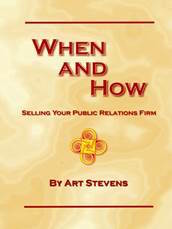|
Art Stevens |
But others have been disastrous. I can’t stress enough how important those initial meetings are. Yes, they’re kind of like blind dates where two parties meet knowing something about each other but haven’t met in person as yet. The major similarity in the seller-buyer scenario is that both parties are exploring a deal for life — and first impressions matter a great deal.
 I put a lot of effort into coaching and training both would-be sellers and buyers on how to approach a first meeting. Generally, it’s about getting to know one another personally, describing respective businesses and vision and determining if there’s a sense of compatibility, a mutual vision and excitement over the prospects of blending agencies.
I put a lot of effort into coaching and training both would-be sellers and buyers on how to approach a first meeting. Generally, it’s about getting to know one another personally, describing respective businesses and vision and determining if there’s a sense of compatibility, a mutual vision and excitement over the prospects of blending agencies.
Despite the coaching and preparation for the initial meeting, some sellers shoot themselves in the foot by expressing themselves in ways that turn buyers off. To my mind, such sellers have blown a potential opportunity of a lifetime by how they present themselves and what they say.
Here are typical “no-no’s:
• “I’m not sure why I’m here. I don’t know if I really want to sell my business, but I’m certainly happy to listen.”
--Don’t take a meeting if you truly aren’t interested in selling your firm. Why waste everyone’s time?
• “My firm hasn’t grown in years. I’m here because maybe you can bail me out.”
--Wrong. Don’t be insecure, defensive and submissive. This isn’t the attitude a buyer wants to see.
• “I’m here because I really don’t know what I want to do. Maybe you can help me with that decision.”
• “I met with your competitor recently but we weren’t able to reach an agreement.”
--Wrong. Do not share other experiences you’ve had with potential buyers. That is not the motivating consideration that you may think it is. Actually, it’s a turn off, because the message is that your firm has been already rejected by other buyers.
• “We aren’t going anywhere as an agency. And I’m personally very tired of the daily grind. Will you bail us out?”
Be sure you’re familiar with your firm’s recast, actual P&L numbers. Many PR agency owners take home a huge percentage of their agency’s revenues. For example, it’s not uncommon for an agency owner with fees of around $5 million to take home up to one million dollars personally. But this fact may not be reflected in the financial statements put together by the agency’s outside auditor. The auditor may include this override in the operating statement as part of staff payroll and the profit reported might just be around five percent.
Yet if the owner’s additional compensation above and beyond standard industry salary for an agency of that size were moved to the bottom line, the profit number would be more accurate. In fact, it might even be at least 15 percent, not five percent.
So don’t go into such a meeting and say: “Our profits are very low. We only do five percent.”
You’ll be shown the door very quickly.
I exaggerate to make the point. But you would be very surprised by how many agency owners address an initial meeting with a buyer with a defeatist attitude. A buyer wants to see vision, excitement, motivation and confidence. The first meeting should be to share values and what each can do for the other. Those sellers who bring pessimism, ennui, insecurity and lack of vision need not apply.
The best initial meetings I’ve attended between seller and buyer are those where the two parties are almost tripping over each other’s words. They share optimism and a common vision for what each can do for the other. The whole purpose of being acquired is to join forces with an organization that can help a seller grow and prosper. It’s a blending of talents and capabilities. An ideal acquisition is not to bail someone out but to plant the seeds for mutual growth.
How a seller expresses himself at a first meeting will determine if there’s a meeting of the minds and further discussions, or if there’s a “don’t call us, we’ll call you” ending.
* * *
Art Stevens is Managing Partner of The Stevens Group.



 Spectrum Science acquires clinical trial recruitment and engagement solutions provider Continuum Clinical.
Spectrum Science acquires clinical trial recruitment and engagement solutions provider Continuum Clinical. How PR agency owners can navigate the M&A process in a way that yields a rewarding experience for both owners and the teams they leave behind.
How PR agency owners can navigate the M&A process in a way that yields a rewarding experience for both owners and the teams they leave behind. Ten potential ways an agency sale can positively benefit team members and employees.
Ten potential ways an agency sale can positively benefit team members and employees. Kekst CNC reps Palladium Equity Partners and its joint venture affiliate, Palladium Heritage, on the acquisition of National Auto Parts, USA;, NAP San Diego; and National Auto Parts-Oakland to form Collision Auto Parts, a platform serving customers in the automotive aftermarket collision repair sector.
Kekst CNC reps Palladium Equity Partners and its joint venture affiliate, Palladium Heritage, on the acquisition of National Auto Parts, USA;, NAP San Diego; and National Auto Parts-Oakland to form Collision Auto Parts, a platform serving customers in the automotive aftermarket collision repair sector. ICR has acquired Bullfrog + Baum, the 23-year-old PR shop focused on the hospitality, lifestyle, travel and consumer marketing sectors.
ICR has acquired Bullfrog + Baum, the 23-year-old PR shop focused on the hospitality, lifestyle, travel and consumer marketing sectors.


 Have a comment? Send it to
Have a comment? Send it to 
No comments have been submitted for this story yet.